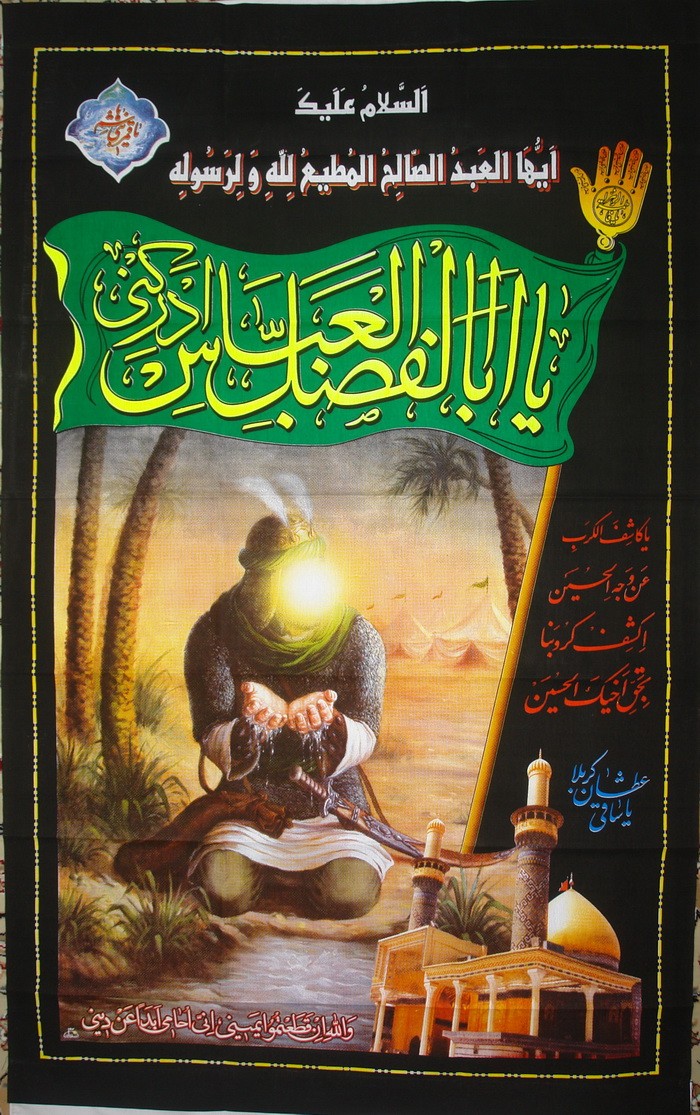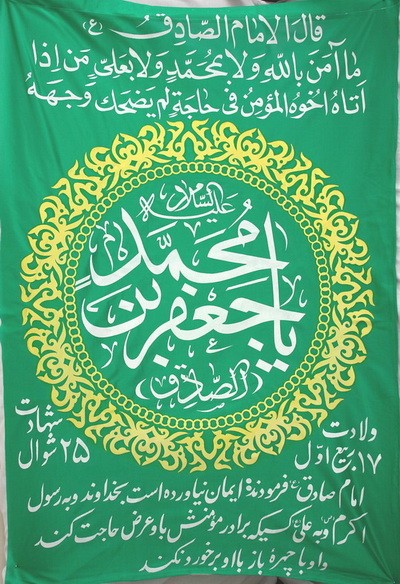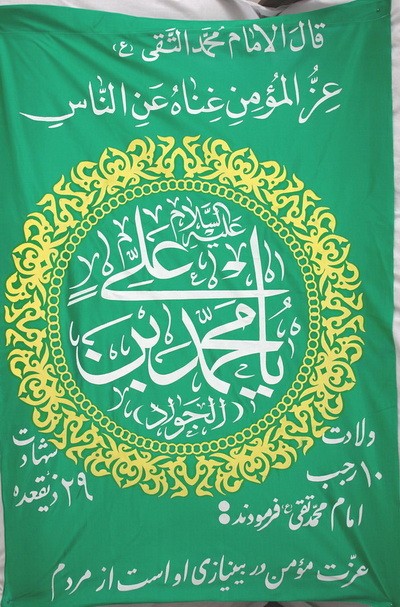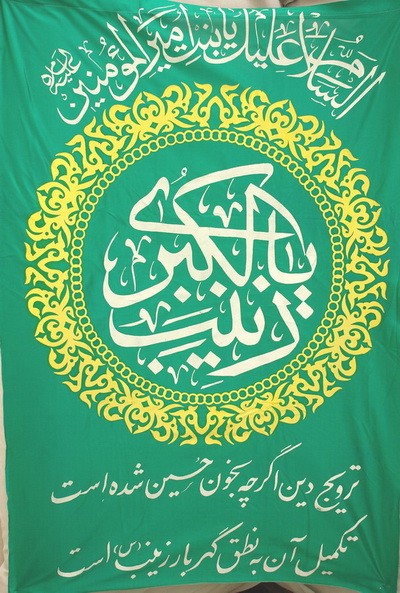Description
On the flag on this Katibeh is written YA ABAL-FAZL AL-ABBAS ADREKI that is a request from this Saint for help. Above it is written ASSALAM-U ALAIKA YA AYYOHAL-ABD AS-SALEH AL-MOTI’O LELLAH VA LE-RASULEH that means Salution to you oh Good Servant of Allah Obeying Allah & His Messanger. On the left side of it is written YA QAMAR BANI HASHIM that is a nick name of Hazrat Abbas as Qamar means Moon meaning beautiful in Arabic literature as Abbas was so handsome between Bani-Hashim tribe & as Moon moves round Earth & Sun, He was always obeying His Imams.
On the Left side is a Dua that means Oh the Great Person who was always removing Sadness from Imam Husayn’s Face, please help us & remove all our problems & sadnesses.
Below it is written Oh Water Provider of the Thirst People in Karbala.
Below it is the Holy Shrine of this Great Personality in Karbala.
Besides it is written the poem he was saying after His Right Hand was cut in Karbala that was I swear in Allah’s Name that even if you cut my right hand, I will still continue protecting my religion forever.
Such Wall Hangings are mostly used by Shia Political & Military Groups in Iran, Iraq, Pakistan & Lebanon.
Although not a Real Imam, peoples of Karbala call Him Imam Abbas.
Al-Abbas ibn Ali
Al-‘Abbās ibn ‘Ali (Arabic: العباس بن علي) (born 4th Sha‘bān 26 AH – 10 Muharram 61 AH ; approximately May 15, 647 – October 10, 680) was the son of ‘Alī ibn Abī Tālib (first Shi’a Imam and fourth Rashidun Caliph) and Fātimah bint Hizam al-Kilabiyyah (commonly known as: Ummul Banīn – Mother of the Sons).
Al-‘Abbās is particularly revered by Shī’ah Muslims for his loyalty to his half-brother Husayn ibn ‘Alī, his respect for the Ahl al-Bayt, and his role in the Battle of Karbalā. He was known as the greatest warrior in Arabia and mirrored the strength of his father, ‘Alī ibn Abī Tālib.
After being told by the archangel Gabriel about what would happen to his grandson Husayn at Karbalā, Muhammad informed both Fātimah and ‘Alī. After the death of Fātimah, ‘Alī asked his brother ‘Aqīl to search a wife for him of courageous descent, who would bear him a son that would help Husayn in his hardship. ‘Aqīl pointed out Fātimah al-Kilabiyyah, who was descended from the honored lineage of Hizam ibn Khalid ibn Rabi’a ibn Amr Kalbī.
Battle of Karbala
Abbas showed his loyalty to Husayn at the Battle of Karbala. After succeeding his father to Muawiya ibn Abu Sufyan as Caliph, Yazid ibn Muawiyah required Husayn to pledge allegiance to him. Husayn refused to do so, saying: “I am the grandson of the messenger of Allah and Yazid is a drunkard, womanizer who is unfit for leadership. A person like me does not pay allegiance to a person like him”. In 60 AH (680 CE), Husayn left Medina, with a small group of his companions and family, to travel to Kufa. The people of Kufa said that they would support Husayn if he claimed the Caliphate. On the way, Husayn and his group were intercepted. They were forced into a detour and arrived in Karbala on the 2nd of Muharram, 61 AH. Husayn’s camp was surrounded and cut off from the Euphrates river. The camp ran out of water on the 7th of Muharram.
On 8 and 9 Muharram, Husayn refused to send Abbas to fight for water. Abbas was extremely eager to fight. Husayn asked Abbas to dig a well. Abbas and some of the Banu Hashim men began digging. But there was no success.
Martyrdom
The Euphrates river was occupied by Yazid’s Army to prevent the camp of Hussien from getting water. Shias believe that Abbas, because of his skill and bravery, could have attacked Yazid’s army, occupied the river, and retrieved water for the camp alone. However, Abbas was not allowed to fight. He was only allowed to get water. Thus, he went to the river to get water for Husayn’s 4 year old daughter Sakina bint Husayn. Sakina was very attached to Abbas, who was her uncle. To her, Abbas was the only hope for getting water. Abbas could not see her thirsty and crying “Al-Atash” (the thirst). When Abbas entered the battlefield, he only had a spear, and a bag for water in his hands. He was also given the authority to hold the standard (liwa’) in the battle. Once he had made it to the river, he started filling the bag with water. Shias emphasize that Abbas’s loyalty to Husayn was so great, that Abbas did not drink any water because he could not bear the thought that Sakina was thirsty (The essence of this event was to illustrate that Abbas conquered the Euphrates river, held it with his mighty hands, yet still did not drink, just to prove his loyalty and the level of his excellence. For until this very day the water from Euphrates river circles the grave of Abbas) . After gathering the water, Abbas rode back towards the camp. On his way back, he was struck from behind and one of his arms was amputated. Then, he was stuck from behind again, amputating his other arm. Abbas was now carrying the water-bag in his mouth. The army of Yazid ibn Muawiyah started shooting arrows at him. One arrow hit the bag and water poured out of it. At that moment, Abbas lost all hope. One of Yazid’s men hit his head with a mace and Abbas fell off his horse without the support of his arms. As he was falling, he called, “Ya Akkha” (“Oh master”). According to Shia tradition, Abbas fell first onto his face before he let the standard fall.
He tossed on the burning sand with excruciating pain. He called for his master. Husayn immediately came to him lifting his head and taking it into his lap. Abbas lifted his head off Husayn’s lap. Husayn put Abbas’s head onto his lap, but Abbas forced it off his lap again.
Shia historians say that this was the first time in his life that he called Husayn his brother. He was killed on Friday, 10 Muharram 61 Hijri on the banks of the river Euphrates). Hence, he is called Hero of Al-Qamah (another name for the river Euphrates). His death is generally mourned on the 9th night of Muharram. Shia Muslims mourn the death of all martyrs of Islam associated with Husayn in the month of Muharram, the first of the Islamic calendar, mainly in the first ten days (see Remembrance of Muharram). Fadl ibn Abbas and Qasim ibn Abbas also laid down their lives at Karbala. Ubaydullah ibn Abbas lived to champion Islam and continue the lineage of Abbas with five sons of his own.
After the battle of Karbala ended, the dead bodies of the slain warriors were lying about without heads. The enemy forces decided to run their horses over the bodies. They did this in order to inflict the maximum possible humiliation on the households of Muhammad and Ali.
Al-‘Abbās Mosque,beutiful tomb,minaret and huge entrance Karbala, Iraq.
‘Abbās was buried at that ground where he fell from his horse in Karbalā, Iraq. The Al-‘Abbās Mosque was built around his grave, to which millions of pilgrims visit and pay homage every year.




Reviews
There are no reviews yet.